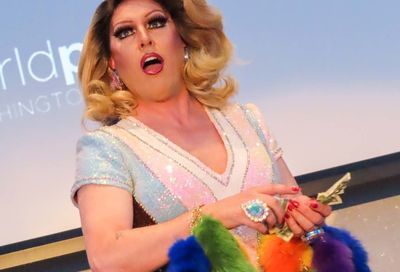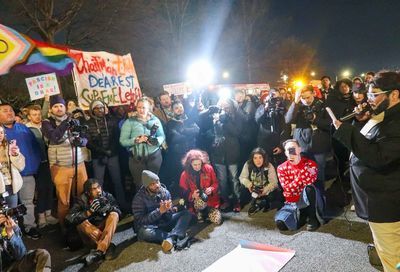The Takei Time
Star Trek put him on the map. Facebook launched him to superstardom. And a musical called Allegiance is earning him raves. What's next for George Takei? Only time will tell.

Sen. Dan Inouye, George Takei, Brad Altman and Irene Hirano Inouye
MW: What was your first experience?
TAKEI: It was at age 14. With a camp counselor. It was exciting — it was also kind of scary and delicious. All those things at the same time. He said not to talk about it, and I didn’t want to talk about it. I was kind of afraid to have it again, despite the fact that it was so wonderful, because it was forbidden.
MW: How did being Japanese-American play into that culturally? Was there a guilt component?
TAKEI: There wasn’t a guilt component. But even in the Japanese-American community, it wasn’t spoken about. It was not societally acceptable. My father was a liberal Democrat politically, but, you know, homosexuality was never even discussed, much less thought of. And so I knew that it was going to be a secret thing that I was going to keep. So I hid it and played a double role.
MW: Did you come out to your parents?
TAKEI: My father had passed by the time I was ready to come out, but I’d like to think given his philosophy and orientation to society he would have accepted me. He was very supportive of me in everything. My father understood me, knew who I was, encouraged my interests. He knew I was a theatrically oriented kid. I remember when we first came out of the [internment camps], we were absolutely poverty stricken. We were penniless. But he said, ”There’s a form of theater that’s dying out, and you may never be able to see it again.” I thought the whole family was going to be going, but he took just me on the streetcar to downtown Los Angeles to the Orpheum Theatre to see vaudeville. It was a thrilling discovery, but at the same time the structure itself — the Orpheum Theatre — was an amazing revelation. It had been a few months since we came out of internment camp and here’s this vast, vaulting space, gilded, with crystal chandeliers glittering and plush carpeting — and that’s just in the lobby.
Finally, after my father passed I came out to my mother. I’d been with Brad for some time and he was more than just a friend as I had told them he was. It was a little difficult for her, but she also knew Brad as a person and it wasn’t like an idea — you know, “George likes guys,” it was Brad. She knew the person — it was personalized — and so ultimately she came around.
MW: How old were you at the time?
TAKEI: In my 30s. I was out quietly. I chose to be an actor, and that again puts another emphasis on being closeted because you go out for auditions — and I liked to think I was equally qualified for a role as anybody else there, but it’s either too tall, too short, too fat, too skinny, too Asian or not Asian enough, that sort of thing. And I didn’t want to add another “too this” or “too that.” It wasn’t a plus to be known as gay so you keep that hidden. Being an actor, it was easy to play the part [of straight].
MW: If you were an out gay actor in 1966, do you think you would have been cast in the original Star Trek series?
TAKEI: It’s an iffy question, but most of my Star Trek colleagues [knew]. And I felt comfortable with my colleagues. When you’re doing a series, you’re with each other for months on end for each season, and you have the wrap party on Friday nights — the beer is trundled out and the pizza’s ordered in and people bring their wives or husbands or boyfriends or girlfriends. And I had my friend at the time come. Show people, movie people, they’re sophisticated people. So when I had a male friend with me, my colleagues took it in stride. And if it’s the same guy more than a couple of times, they say, ”Oh, I get it.” And that’s it. They know, but they understand and keep it quiet.
This is an anecdote I’ve told before, but Walter Koenig, who played Chekhov, and I were standing at the coffee urn one morning as the extras were assembling on the set. Walter kept making this head gesture, signaling me to turn around and look behind me. So I turned around and looked. There was this gorgeous young guy in a tight Starfleet shirt with wonderful pectorals and great, flashing blue eyes and brunette hair. He was strikingly handsome. I turned around and grinned and Walter winked. That’s when I realized Walter knew. There was this kind of silent understanding of the situation.
MW: It must have been very gratifying to know that Walter was saying, ”I know and I accept it,” but in a tacit way of doing so.
TAKEI: Exactly.
MW: This begs the question: Do you prefer men in Starfleet uniform?
TAKEI: [Laughs.] I prefer them out of it.
MW: William Shatner was famously —
TAKEI: Clueless.
MW: He made such a fuss about not being invited to yours and Brad’s wedding.
TAKEI: Let me tell you about that. He did get an invitation. We wanted to be inclusive so we sent invitations to every one of the members of the cast. And we heard from every one of them except Bill. Which was not surprising, because that’s Bill’s modus operandi. Bill has a very inflated sense of the tier in the pecking order that he belongs to. He won’t deign to come to a party that the rest of us had, but he would go to a party that Leonard might have. When one of us gets a star on the Hollywood Walk of Fame, we all gather to support and applaud and celebrate — except Bill. Even that famous rollout of the space shuttle Enterprise, we all went, except Bill. Bill never comes to things. He wasn’t even at Gene Roddenberry’s funeral or Majel Roddenberry’s funeral.
So we weren’t surprised when Bill didn’t RSVP for our wedding. We said, “It’s typical Bill.” And the wedding came and went, and two months after the wedding he goes on YouTube and publicly rants and raves about George not inviting him to the wedding. We were absolutely baffled. I mean if he wanted to come — and maybe something happened to the mail — he could have phoned us. Why go public two months later when there’s no point to it? Then Brad and I happened to be driving down Sunset Boulevard shortly after his rant, and there’s this huge billboard that reads ”William Shatner’s Raw Nerve,” his new talk show. He needed publicity and the best way to get publicity is to create a controversy.
The other point that underscores how phony that rant was is that he was on The Howard Stern Show promoting something else — I think he had a book coming out — and Howard asked him about our wedding and so forth, and he went into that rant again. Then Howard said, ”Well, what do you think of Brad?” And Bill says, ”Who’s Brad?” He had no idea of my husband’s name, no idea who Brad was. They had to tell him. He’s the guy that George married. He’s George’s husband. And he sputtered a bit. He does it all for publicity.
MW: Do you ever look at your old Star Trek performances, particularly from the original series?
TAKEI: The little clip that I get constantly exposed is my fencing bit from The Naked Time. Whenever there’s an Internet piece on me they run that. I’ve seen that a zillion times, but that was the most fun episode that I got a chance to do. I was in pretty good shape then, but a little on the hammy side.
MW: Do you prefer the movies to the TV series?
TAKEI: Each has its pluses and minuses. Television goes at a nice rapid pace — you don’t get rehearsals and it keeps you on your toes. Movies — particularly the very first Star Trek movie, on which they had a huge budget — doesn’t call for you to be doing much except sitting at the console. It’s lethargy that you have to fight the most when you’re on camera — to make it as alive as possible demands all the professionalism you can bring. You have these long waits in between set-ups. They futz with every little nuance. Which is wonderful, but at the same time as an actor you have to keep the adrenalin going and that becomes the big challenge.
Support Metro Weekly’s Journalism
These are challenging times for news organizations. And yet it’s crucial we stay active and provide vital resources and information to both our local readers and the world. So won’t you please take a moment and consider supporting Metro Weekly with a membership? For as little as $5 a month, you can help ensure Metro Weekly magazine and MetroWeekly.com remain free, viable resources as we provide the best, most diverse, culturally-resonant LGBTQ coverage in both the D.C. region and around the world. Memberships come with exclusive perks and discounts, your own personal digital delivery of each week’s magazine (and an archive), access to our Member's Lounge when it launches this fall, and exclusive members-only items like Metro Weekly Membership Mugs and Tote Bags! Check out all our membership levels here and please join us today!




















